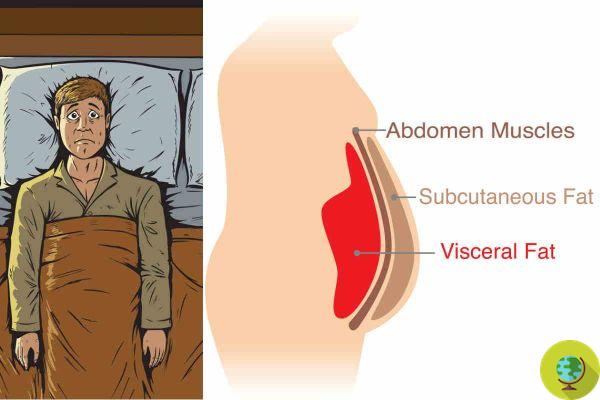
Does little sleep also affect the fat that accumulates on our belly? Let's see what the results of a new search tell us.
Don't store avocado like this: it's dangerousMany scientific studies have already shown how little sleep increases the risk of obesity, however new US research has shown that insufficient sleep levels lead to a 9% increase in fat specifically in the abdomen area and 11% of the visceral fat. The visceral fat in particular it is extremely dangerous, as it is deposited deep around the internal organs present in the abdomen and is strongly linked to the development of heart and metabolic diseases. (Also Read: Walking: How To Burn More Calories And Abdominal Fat While Strolling With These 7 Tricks)
So let's deepen the research results.
A systematic review
The study published in the Journal of the American College of Cardiology looked at the prevalence of sleep disorders in the American population, caused in part by shift work and the use of electronic devices during hours when the body should be at rest. Also, as waking hours increase people tend to eat more, but this is not matched by increased physical activity.
Research results show that reduced sleep, even in young, healthy, and relatively thin individuals, is associated with increased calorie intake, mild weight gain, and a significant increase of the accumulation of fat inside the belly. Normally, fat is deposited subcutaneously or under the skin. However, inadequate sleep appears to redirect fat into the most dangerous visceral area. Importantly, although subjects who regained lost sleep experienced a decrease in calorie intake and weight, however, visceral fat continued to increase. This suggests that inadequate sleep is a trigger factor due to the accumulation of visceral fat and that even recovery sleep cannot reverse this accumulation. In the long run, poor sleep quality can lead to the development of diseases such as obesity e cardiovascular diseases.
The research followed 12 subjects divided into two groups, one of whom always slept for 9 hours while the other slept intermittently for 4 hours. Each group could freely choose which and how much food to eat. The researchers looked at energy intake, energy expenditure, body weight and fat distribution, including visceral fat. Participants who slept less consumed 13% more protein and 17% more fat, while the levels of energy expenditure remained the same between the two groups.
Experts therefore advise to practice more physical activity e follow a healthier diet to all people who for various reasons cannot sleep for 8 hours every night, such as all those who have shift work. However, further studies are needed to confirm the relationship between sleep disturbances and body fat accumulation.
Follow us on Telegram | Instagram | Facebook | TikTok | Youtube
Source: JACC
On visceral fat, you may also be interested in:
- This is the best vegetable you should include in your diet every day to lose weight and belly fat
- Eating this fruit every day reduces belly and dangerous visceral fat (especially in women)
- Obesity: new and serious side effect on lungs of excess abdominal fat discovered (especially in women)
- The spice that actually burns visceral fat (and prevents cancer)
- Can this green drink really burn visceral fat and speed up your metabolism?


























